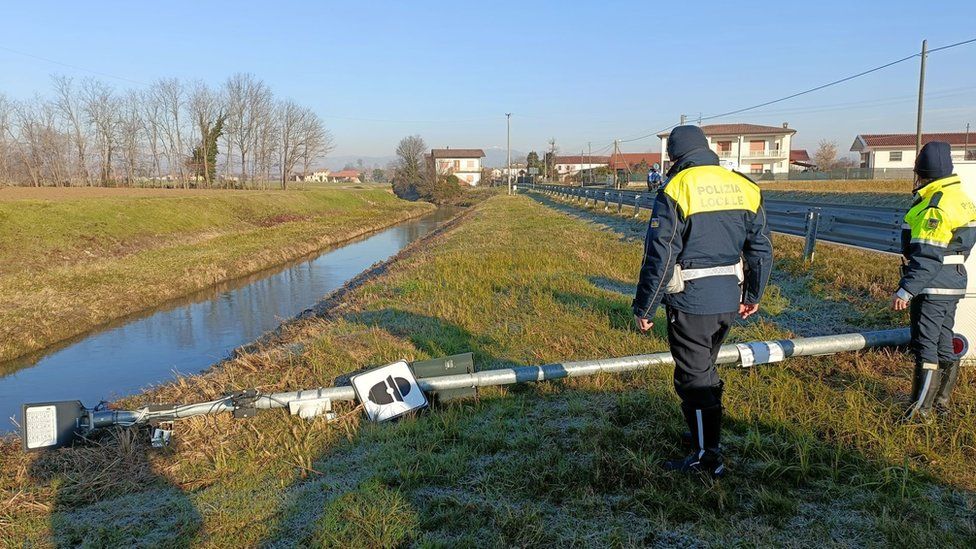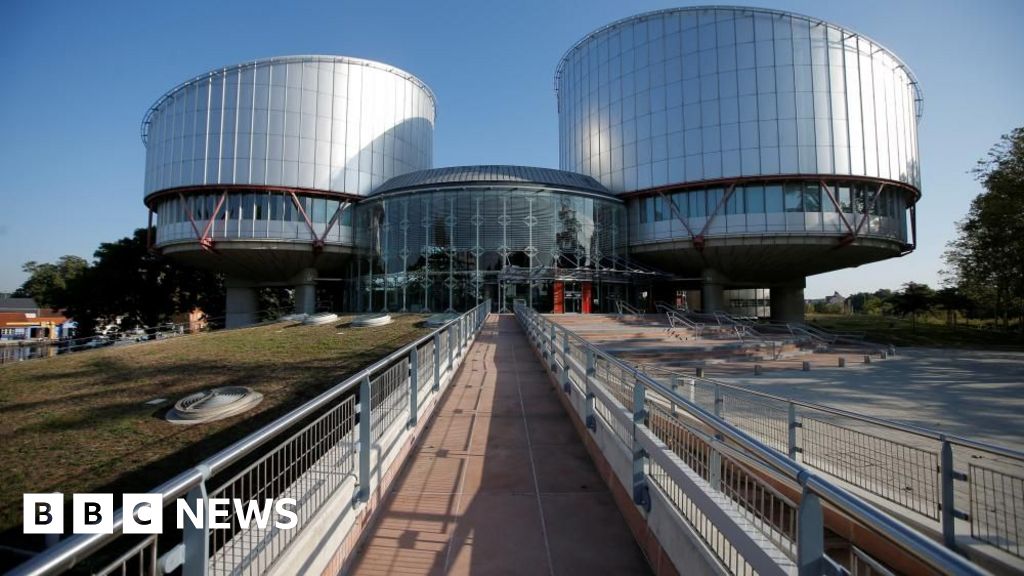ARTICLE AD BOX
 Image source, Nuovetecniche/Simone Piccirilli
Image source, Nuovetecniche/Simone Piccirilli
At least 15 speed cameras have been destroyed across Northern Italy
By Stefano Fasano
BBC News, Rome
Italy has been gripped by a vigilante who calls himself "Fleximan" and has made it his mission to tear down as many speed cameras as possible.
Fleximan has already claimed at least 15 successful strikes, and a special police task force and four different prosecutors' offices are now investigating the attacks.
The anonymous vandal began leaving a trail of destruction months ago in the north-east, as more and more of the cameras were put out of action.
Photos of his actions then spread on social media, along with the nickname taken from the Italian word for angle grinder, flessibile - the tool he has mostly used to destroy the cameras.
The campaign may reflect popular anger about the proliferation of speed cameras, but road deaths in Italy are higher than in many other European countries.
What is not clear is whether Fleximan is one man or two, or perhaps he has become a number of copycat vandals.
Police in the north-west Piedmont region say they have charged a 50-year-old suspect, but most of the attacks have taken place in the Veneto area of the north-east.
Image source, Asti prefecture
Image caption,Closed-circuit TV captured two men sawing down a speed camera in the north-western Asti area
At the scene of one of his most recent attacks, the anonymous vigilante left a handwritten message: "Fleximan is coming."
The vandal's methods are consistent, and the chorus of approval is growing on social media, where Fleximan is treated as a sort of modern Robin Hood.
So much so that a street artist in Padua called Evyrein has dedicated his latest work to Fleximan. His graffiti depicts Uma Thurman's character from Kill Bill, holding a sword in one hand and a cut-up speed camera in the other.
The autovelox, as it is known in Italian, has always been contentious in Europe. But Italy is known to have the highest number on the continent, estimated at more than 11,000.
That's a third more than the UK's 7,700 and almost three times as many as in Germany with 4,700.
This is likely to explain some of the anger towards the Italian speed detector, and local mayors have said they won't replace the vandalised cameras just yet. The official reason is to calm the situation down.
This camera was dismantled near Padua in the north east
Fines imposed on drivers have risen dramatically in recent years, with Florence taking €23.2m ($25m; £20m) in 2022, according to Italian consumer group Codacons, followed by Milan, Genoa and Rome.
But Italy has a less than impressive track record on road safety. The European Transport Safety Council put the number of deaths in Italy per million inhabitants at 54 in 2022, almost twice as many as the 26 per million lives lost in the UK and 37 per million in Spain.
For Paola Di Caro, a political journalist with Italian daily newspaper Corriere della Sera, these numbers are highly personal and she has directly challenged Fleximan's narrative of standing up for people's freedom with her own devastating experience.
Her 18-year-old son Francesco Valdiserri was knocked down and killed by a speeding driver as he waited for a bus in Rome in October 2022.
"I would just like [Fleximan] to feel for one day, just one day, what I feel when I go to lay flowers where my son was killed… and then at [the cemetery in] Verano where he was closed forever behind poured concrete."
As she headed to her son's grave, she told the BBC that the Fleximan enigma reflected a culture that tells people they have the right to feel that rules do not apply to them.
"People hail him as a hero, but Fleximan for me is just shameful. The idea that these actions may be done for fun… is just unbearable to me. It is like they are making fun of my son."
Image source, Paola di Cara
Image caption,Paola di Cara's son Francesco was killed by a speeding driver in Rome
The speed camera story has also entered Italian politics, with nationalist League leader Matteo Salvini eyeing an opportunity ahead of regional and European parliamentary elections.
Mr Salvini, who is also transport minister and deputy prime minister, has targeted the mayor of Bologna, Matteo Lepore, for bringing in a new 30km/h (18mph) speed limit across the city.
The Bologna speed reduction was signed off by Mr Salvini's own ministry, and inspired by European Commission figures that show the risk of death for pedestrians is eight times higher at 50km/h than at 30km/h.
Bologna's reduced speed limit has kickstarted a drivers' protest, and a campaign for a referendum on the issue has attracted more than 52,000 names.
"The problem is that a 30km/h limit is just too low," complained Guendalina Furini, a 22-year-old student who started the petition.
"It takes too long to cross the city, and it does not solve the real problem, which is people driving while under the influence of alcohol or drugs," she explained.
She challenged the mayor at a recent meeting, so far with no success.
Although she admits she is no expert on safety statistics she wants her voice to be heard.
"We have obtained the right to divorce and abortion through referendums, why shouldn't this be decided in that way too? This is not the democracy I am studying at university."

 11 months ago
80
11 months ago
80








 English (US) ·
English (US) ·